Demon Gaze Vita Review: The Vita's Answer to Etrian Odyssey?
Kadokawa Games' dungeon crawler is a wonderfully accessible introduction to the genre -- and proof a game doesn't need to be overly flashy to provide an enjoyable, addictive experience.
This article first appeared on USgamer, a partner publication of VG247. Some content, such as this article, has been migrated to VG247 for posterity after USgamer's closure - but it has not been edited or further vetted by the VG247 team.
I wasn't quite sure what to expect when I booted up Demon Gaze.
The last grid-based dungeon crawler I played in any great depth was Westwood Studios' Lands of Lore, and that was back in the mid-'90s -- since then, I've typically preferred the more linear, narrative-focused experience offered by what we tend to refer to these days, for better or worse, as "JRPGs." As such, I was a little skeptical as to whether or not Demon Gaze would hold my attention for very long, being unashamedly old-school in a number of different ways.
As you'll know by now if you read my first impressions from a short while ago, it most certainly did hold my attention -- until some ungodly hour in the morning on more than one occasion, to be precise. And not for the reasons I expected it would, either; while I've found the narrative aspect of it enjoyable thanks to some very endearing characters -- not to mention the gorgeous, gorgeous artwork throughout -- it's actually been the more traditional, old-school dungeon-crawling, mapping and fighting side of things that has been keeping me coming back for more time and time again.
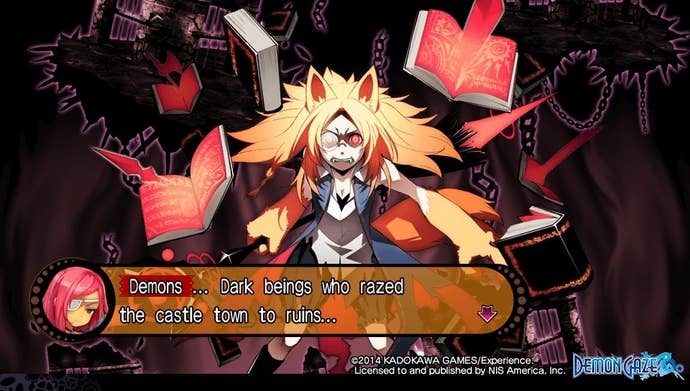
In Demon Gaze, you take on the role of Oz, an amnesiac hero who has the power from which the game takes its name: essentially the ability to stare at demons really hard until they get sucked into his... well, somewhere about his person -- the game never quite explains where -- and can subsequently be converted into Demon Keys for summoning at will. Since Oz's power is not a common one to come around, he is promptly declared the Last Great Hope of the small castle town surrounding the ominous fortress of Grimodar, and sent off into the wilderness to hunt down demons, earn some money to hire new party members and, eventually, storm Grimodar and prevent the Big Horrible Bad Thing from coming out and eating everyone. Simple, right?
Demon Gaze's plot may be as cliché as they come, but it's delivered with such enthusiasm and energy it's hard not to get wrapped up in what's going on. And the method through which the plot is delivered works well, too; rather than your dungeon-crawling constantly being interrupted by lengthy exposition sequences, the narrative is instead largely confined to exchanges between Oz (whom you constantly play from a first-person perspective, even in story scenes) and the various non-player characters who inhabit the inn that acts as your "base" between expeditions. These are a colorful bunch, ranging from the enigmatic innkeeper Fran, whose mysteries are gradually revealed over the course of the game, to the resident mortician Prometh who lives in the basement, sleeps in a casket and has a habit of staggering past in the background of conversations having apparently forgotten to put any clothes on. There's a real feeling that these are established characters with histories from well before Oz shows up; the bickering between weapon shop owner Cassell and item shop owner Lezerem that inevitably descends into threats to shove increasingly large items of weaponry up each other's assholes depicts the sort of relationship that only develops over years of unsteady friendship, for example.
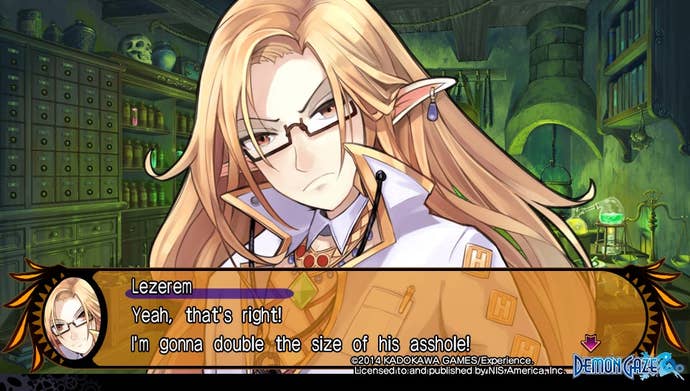
The plot merely serves as a framework for the meat of the game, however: delving into dungeons, uncovering their mysteries and ultimately kicking the bottom of whichever demon calls that dungeon their domain. Structurally, the game is very simple -- you enter a dungeon, toss a gem into each of the Demon Circles around said dungeon and fight anything that comes out, then fight the resident demon when you've taken control of all the circles. After that, you return to the inn, get a bit of plot, unlock a new dungeon and head back out. Repeat until final boss.
This simplicity of structure is what makes Demon Gaze work so well, because it allows for a lot of freedom in terms of how you handle your overall quest, particularly as you can easily return to earlier dungeons at any time and use new-found abilities to reach previously inaccessible areas. You can spend some time grinding to gain experience or money, or you can concentrate on trying to acquire as much loot as possible to either sell for cash or break down into Ether, which can be used to upgrade your weapons and armor. The gems you toss into the Demon Circles transmute into items of equipment when you defeat the guardians that come out of the circle, and harder dungeons yield better equipment. This means that you can usually buff up your characters' gear without having to spend a lot of money on equipment over the course of the game -- which is good, because you're going to need a whole hunk of money just to fill out the remaining four slots in your party roster (represented by hiring increasingly expensive rooms in Fran's inn) and to take care of your adventuring expenses, which you'll be charged every time you come back from an expedition.
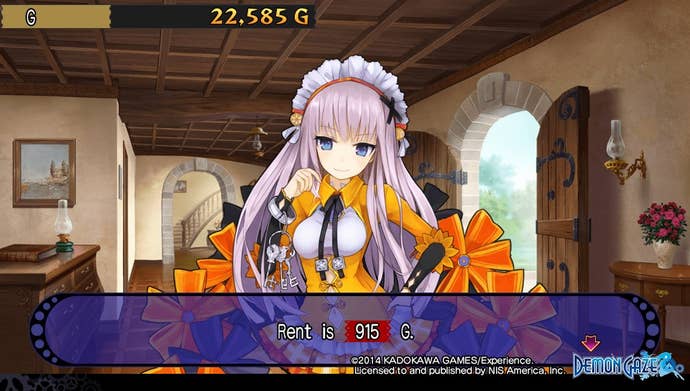
Demon Gaze eases you in to its gameplay with some simple quests at the outset, but after that it largely leaves you up to discover things for yourself, and it sure as hell isn't going to give you any explicit hints. This is perhaps most apparent in the "loot maps" you occasionally find as treasures in the dungeon, which give a grid reference, an area name and a hint as to which demon you'll need to uncover a treasure hidden in a wall. Trouble is, the words on the loot map deliberately don't correspond to the names of areas and demons in the game, so you have to actually use a bit of brainpower to decipher them -- a decision which has the pleasant side-effect of making an actual discovery of some of this loot enormously satisfying.
Oddly enough, though, you don't have to rely solely on your own intuition, skills of deduction and curiosity to make it through the game and discover its secrets. A Dark Souls-style message system allows you to scrawl memos on the dungeon floor that can either help or hinder other online players. Like the Souls series, you're not free to leave just any old message using free text input -- though for those with a childish sense of humor, it is possible to leave a memo that just says "Butts Butts Butts Butts Butts" if you so desire -- instead, you pick from a wide selection of preset words and phrases in order to construct your message, which is subsequently uploaded the next time you get a loading break between areas. In turn, you'll receive memos from other players -- though you'll never know who wrote what -- that you can choose to heed or ignore as you see fit. The way this is implemented is simple and efficient, and the fact it only communicates with the network during loading breaks helps minimize gameplay downtime -- an eminently sensible decision on the part of the developers.
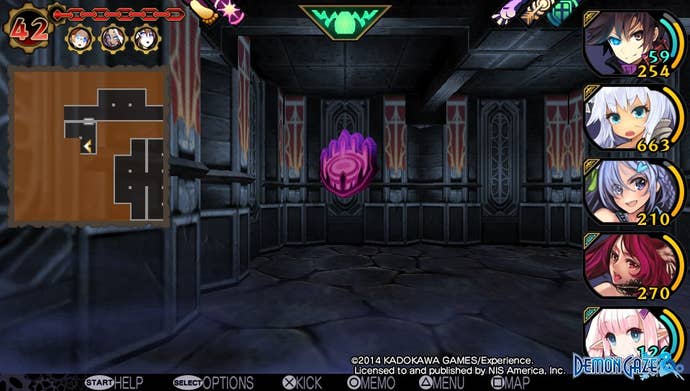
Demon Gaze's dungeons are interesting affairs. The scenery may be a little bland at times -- expect to use your imagination a lot to "fill in the blanks" for a lot of otherwise barren rooms, particularly in "interior" dungeons -- but the well thought out predefined layouts and devious environmental puzzles more than make up for this. The game also really highlights the marked difference between a hand-crafted map and the increasingly common use of procedural generation in dungeon-centric RPGs these days, with the former option offering a much more interesting experience for my money. There are plenty of old-school grid-based RPG hazards to contend with, too, including "Lost Corridors" (turntables that randomly cause you to face one of the four cardinal directions), one-way doors, water currents that send you uncontrollably to somewhere else on the map, secret doors, floors that damage you unless you have an appropriate demon equipped, and all manner of other things besides. I also found it quite amusing that after clearing the game's first few dungeons the game then basically goes "You thought that was a dungeon? This is a dungeon!" by throwing you into Grimodar Castle, a multi-level monstrosity that will keep you plenty busy throughout much of the rest of the game.
Unlike the series it's obviously taking pot-shots at -- Atlus' Etrian Odyssey -- Demon Gaze doesn't expect you to map the entirety of these dungeons by hand, instead offering a robust automap system with an on-screen minimap and full-screen map display with auto-navigation function. You still need to actually step into a space to record it on the automap, though, so if you despise holes in your map as much as I do you'll still find yourself exploring with exhaustive thoroughness -- an effort that is usually repaid by some secret rooms for you to loot. The map facility could perhaps do with the ability to add your own markers -- or simply for the game to record key locations with event markers -- but it's otherwise solid and useful, particularly with the auto-move system.
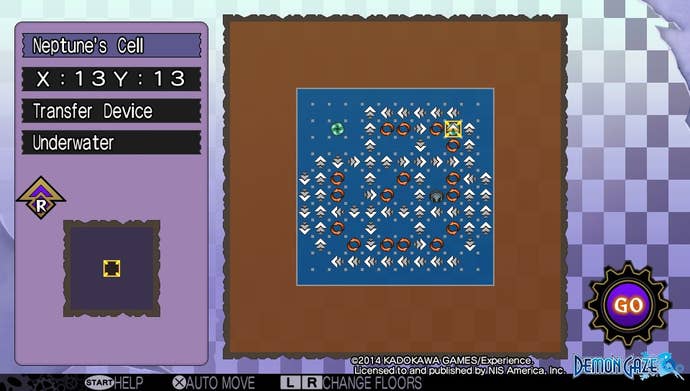
Combat-wise, the game is relatively straightforward and simple -- perhaps a little too much so -- particularly once you've built up your party to have a good combination of abilities. Thankfully, grinding through random encounters is a simple matter thanks to the inclusion of a convenient "Repeat" button that simply makes your whole party do the same thing it did last turn, and animations are brief, simple and backed up by helpful text prompts telling you what just happened. Boss encounters tend to demand a little more in the way of strategy in order to be successful, however; healers and paladins (who can cover the rest of the party and take damage in their stead) become a lot more important, and when facing off against an enemy with the Soul Gaze ability you'll have to use demons defensively as well as just leaving them out to wail on the enemies and support your party. Ultimately, though, the combat does get a little repetitive; it's fortunate that there's a wide variety of different enemy types to discover throughout the game, and that the exploration side of things complements the fighting so well.
Another potential issue for some players is the question of customization. You can make each of your party members, including Oz, look and sound however you want (from a predefined selection of avatars and voice banks, anyway) but you're bluntly informed at the outset of the game that Oz is, canonically, a human male with the Gazer class whether you like it or not, regardless of what he looks like. Similarly, each of the classes you can choose for your party members has its own predefined selection of abilities that unlock as the character levels up, initially seeming somewhat restrictive.
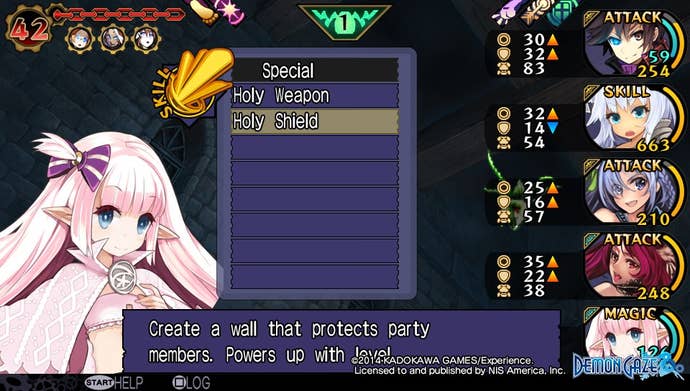
In actual fact, there's a reasonable degree of flexibility, though not so much that it becomes overwhelming. You gain a stat point on every level up, and most classes can equip several types of weapon, each with their own pros and cons. A special class of item known as "Artifacts" allows characters to equip up to five skills from classes that are not their own, too, allowing you to put together some interesting cross-class builds. And you're not stuck with your party, either; while you can only take four companions with you on an expedition, you can keep up to three "in reserve" to swap in and out as needed, making it relatively straightforward to experiment with different party makeups as you see fit, and if someone really isn't fitting your needs it's a simple matter to kick them out, never to be seen again, and replace them with a newcomer. All new characters do start from level 1, though, so expect to be keeping them in the back line for a little while until they learn to hold their own alongside the more experienced members of your team; it's an immensely gratifying feeling when they do.
Overall, Demon Gaze is a solid title, and a particularly good introduction to dungeon-crawlers for those who may not be quite so familiar with the sub-genre. There's a lot of game content to work through, and the whole thing is wrapped up in attractive but low-key presentation that doesn't try to be too flashy but nonetheless looks and sounds great on the small screen of the Vita. The artwork may be static throughout the game, but it's beautifully drawn and captures the personality of each character and creature perfectly. The soundtrack, meanwhile, is enormously catchy and made even more distinctive by the odd (but successful) inclusion of Vocaloid voice synthesizers in many of its tracks.
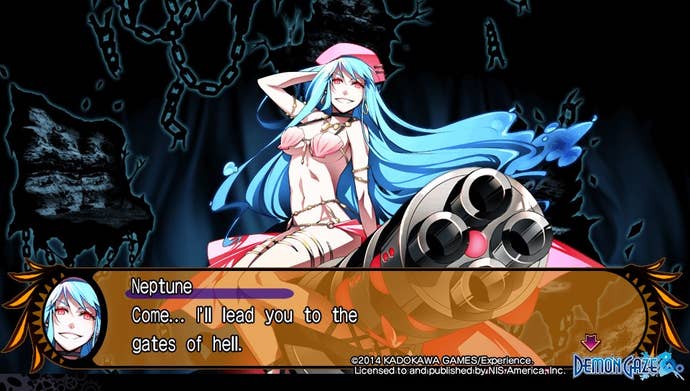
It all adds up to a strong addition to the Vita's growing library of role-playing games, and a title particularly worth picking up if you're in the mood for a challenging Wizardry-like. For those weaned on RPGs that err more towards the "J" side of things, meanwhile, I'd still encourage you to give this game a go -- you might just find yourself, as I did, looking up from a particularly engrossing exploration session and realizing it's 3 in the morning. That, to me, is the sign of a good game; one that will happily engulf your soul in its demonic pleasures if you'll let it.
Now, I'd better be off; I hear Fran calling for the rent money...
The Nitty Gritty
- Visuals: Demon Gaze is light on the animation throughout, but its visual presentation is otherwise excellent, with interesting, distinctive character and monster designs. The dungeons' 3D graphics are a little bland at times -- a little more scenery, particularly in interior locations, wouldn't have gone amiss -- but they serve their purpose.
- Music and Sound: You'll be singing the Vocaloid-heavy tunes to yourself before you know it. The game features dual audio voice acting, too, though only some of the game's narrative sequences are voiced.
- Interface: Demon Gaze doesn't babysit the player and encourages you to experiment with its mechanics yourself. Thankfully, the interface is intuitive enough to make this a painless process.
- Lasting Appeal: A hefty adventure that should keep you busy for a long time. And when you beat it, why not try again with a different party makeup?
ConclusionDemon Gaze is an enjoyable and enormously addictive title that strikes a good balance between endearing JRPG-style narrative and compelling dungeon-crawling exploration, let down only slightly by somewhat repetitive combat.
